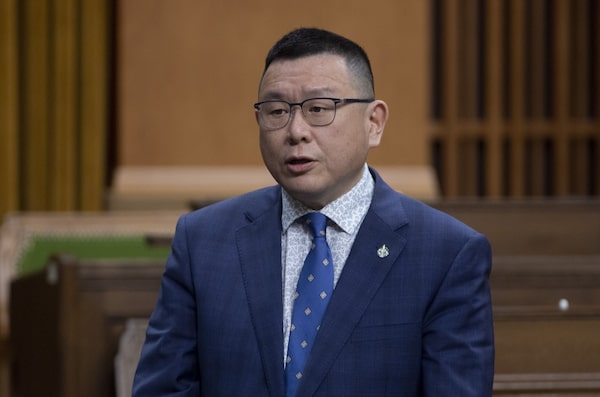
B.C. MP Kenny Chiu was one of the main targets for his private member’s bill to create a registry for those lobbying on behalf of foreign governments.Adrian Wyld/The Canadian Press
Shortly before Christmas, when Canadians were preoccupied with a new COVID-19 variant and holiday plans, the Conservative Party of Canada revealed that it would not attempt to bring back its Special Committee on Canada-China Relations in the new year.
It was a strange decision for a party whose leader has said there is “no greater threat to Canada’s interests than the rise of China.” For years, the Conservatives have hammered the Liberal cabinet for its timid and conciliatory approach to relations with Beijing: for abstaining from a motion recognizing China’s treatment of its Muslim minority as “genocide”; for dithering on whether to join other Five Eyes partners in banning or restricting Huawei’s access to our 5G network; for its apparent inertia in repatriating the two Canadians held hostage by Beijing in retaliation for the arrest of Meng Wanzhou; for failing to provide documents to the Canada-China committee on the firing of two scientists from Winnipeg’s National Microbiology Laboratory in 2020.
The committee, which was initiated by the Tories in 2019 and had the support of all opposition parties in the House, provided a forum to probe these issues and others, including attempts by Beijing to meddle in domestic affairs. Its work was hardly complete when the committee was shuttered with the dissolution of Parliament ahead of the fall federal election, yet the Conservative Party – once hawkish and unrelenting on matters of Chinese Communist Party authoritarianism and disruption – has now morphed into a dove. The party’s official line is there aren’t enough resources to resume its work on China with new parliamentary committees on science and Afghanistan, which is roughly as believable as Beijing’s facile attempts at domestic propaganda.
Did China target a Conservative MP in Canada’s last federal election?
National security can’t become a tool of partisan feuding
A more plausible explanation is the Conservative Party got spooked by the disinformation campaign that targeted the Chinese diaspora during the last election, and instead of channelling that interference as further impetus to continue the committee’s work, the party folded to safeguard its own electoral interests.
Information emerged during and after the fall election that certain communities with high proportions of Chinese-Canadian voters had been subject to an onslaught of disinformation – mostly through WeChat and Weibo – about individual Conservative candidates and about the party itself. B.C. MP Kenny Chiu was one of the main targets for his private member’s bill to create a registry for those lobbying on behalf of foreign governments, which was torqued in a widely disseminated WeChat message to suggest regular Chinese Canadians would be subject to surveillance and suppression. Similar messages were propagated on websites, online newspapers and various social-media accounts.
Mr. Chiu lost the seat he won relatively comfortably just two years earlier, as did the Conservatives’ Alice Wong, who had won the B.C. riding of Richmond Centre (where nearly 60 per cent of constituents are of Chinese origin, according to 2016 census data) four times before; and Bob Saroya, who lost the Ontario riding of Markham-Unionville (where 65 per cent of constituents are of Chinese origin) after winning in the two previous elections.
It’s difficult to conclusively attribute these candidates’ losses to disinformation about the Conservative Party’s agenda, and indeed, Chinese-Canadian voters are not monolithic and base their votes on a myriad of factors. Yet analysis from the Atlantic Council’s Digital Forensic Research Lab, the Canadian group DisinfoWatch and McGill University researchers writing in Policy Options all point to a “co-ordinated influence operation targeting Chinese-Canadian voters,” in the words of DisinfoWatch researchers. And although there is no smoking gun connecting these social-media messages and articles to the CCP, Sze-Fung Lee and Benjamin Fung, writing in Policy Options, say it is “logical to infer that whoever was responsible for disseminating the fake news had a clear motive in reshaping the narratives in favour of Beijing’s interests.”
If Beijing was behind the disinformation campaign targeting Conservative candidates, then Leader Erin O’Toole has now gifted them a win. The propaganda worked: Not only did it arguably cost the Conservatives a few seats, but it also likely scared the party into abandoning its committee created specifically to probe these matters. If Beijing wasn’t behind the campaign, well, the Conservatives gifted them a win anyway: The committee isn’t coming back, one source of heat is off and China didn’t have to lift a finger.
In a meeting of the Canada-China committee on April 19, professor Anne-Marie Brady from the University of Canterbury warned: “Political interference fits within China’s much more aggressive foreign policy as a tool of that foreign policy. It’s a means to achieve China’s goals without military force; to weaken opposition to China’s objectives ... to control the diaspora discourse; and to control the international discourse on issues of interest to China.”
It was a prescient observation then, and surely one worth returning to now in light of what has emerged about misinformation during the last Canadian election. If only there was a forum to probe these matters.
Keep your Opinions sharp and informed. Get the Opinion newsletter. Sign up today.
 Robyn Urback
Robyn Urback